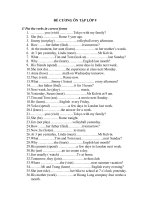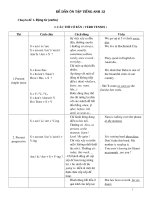ĐỀ CƯƠNG ÔN TẬP TIẾNG ANH 9
Bạn đang xem bản rút gọn của tài liệu. Xem và tải ngay bản đầy đủ của tài liệu tại đây (137.6 KB, 7 trang )
<span class='text_page_counter'>(1)</span><div class='page_container' data-page=1>
<b>BÀI ÔN TẬP LỚP 9: UNIT 7: RECIPES AND EATING HABITS</b>
<b>A. NEW WORDS, STRUCTURES AND GRAMMAR</b>
<b>I. New words </b>
<i>Chop (v) </i> <sub>/tʃɒp/ </sub> Chặt <i>Spread (v) </i> <sub>/spred/ </sub> Phết, bôi, trét
<i>Cube (n) </i> /kjuːb/ Miếng hình lập
phương
<i>Sprinkle (v) </i> /ˈsprɪŋkl/ Rắc
<i>Deep-fry (v) </i> <sub>/ˌdiːp ˈfraɪ/ </sub> Rán ngập mỡ <i>Slice (v) </i> /slaɪs/ Cắt lát
<i>Dip (v) </i> /dɪp/ Nhúng <i>Staple (n) </i> <sub>/ˈsteɪpl/ </sub> Lương thực chính
<i>Drain (v) </i> <sub>/dreɪn/ </sub> Làm ráo nươc <i>Starter (n) </i> <sub>/ˈstɑːtə(r)/ </sub> Mon khai vị
<i>Garnish (v) </i> /ˈɡɑːnɪʃ/ <i>Trang trí (mon ăn) Steam (v) </i> /stiːm/ Hấp
<i>Grate (v) </i> /ɡreɪt/ Nạo <i>Stew (v) </i> /stjuː/ Hầm
<i>Grill (v) </i> /ɡrɪl/ Nương <i>Stir-fry (v) </i> <sub>/ˈstɜː fraɪ/ </sub> Xào
<i>Marinate (v) </i> <sub>/ˈmærɪneɪt/ </sub> Ươp <i>Tender (adj) </i> <sub>/ˈtendə(r)/ </sub> Mềm
<i>Peel (v) </i> /piːl/ Got vỉ, boc vỉ <i>Versatile </i>
<i>(adj) </i> /ˈviɜːsətaɪl/
Đa dụng
<i>Purée (v) </i> <sub>/ˈpjʊəreɪ/ </sub> Xay nhuyễn <i>Whisk (v) </i> <sub>/wɪsk/ </sub> Đánh (trứng …)
<i>Roast (v) </i> <sub>/rəʊst/ </sub> quay
<i>Shallot (n) </i> <sub>/ʃəˈlɒt/ </sub> Hành khô
<i>Simmer (v) </i> <sub>/ˈsɪmə(r)/ </sub> om
<b>II. Grammar: </b>
1.Quantifiers: reviiew: a / an / some / any
2.Modal vierbs in conditional sentences type 1: can / must / may / might / should
<b>B. EXERCISES</b>
<b>I. Choose a word in each line that has different stress pattern </b>
1. A. viersatile B. tomato C. marinate D. chocolate
2. A. include B. combine C. balance D. reduce
3. A. cucumber B. ingredient C. opinion D. nutritious
4. A. teaspoon B. cabbage C. pancake D. canteen
5. A. indiviidual B. supermarket C. aviocado D. information
</div>
<span class='text_page_counter'>(2)</span><div class='page_container' data-page=2>
<b>Answer </b> <b>A </b> <b>B </b>
1. bake A. cook something slowly in hot liquid kept at or
just below the boiling point (85oC/95oC)
2. roast B. cook food in hot oil, or fat
3. boil C. cook food ovier charcoal on a grill
4. fry D. cook or brown food, like bread or cheese by
exposing it to a grill or fire
5. steam E. cook, especially meat, in an ovien or ovier a fire
6. simmer F. cook meat and viegetables slowly in liquid in a
closed dish or pan
7. toast G. fry viery quickly ovier high heat
8. stir-fry H. cook in an ovien without any extra fat
9. barbecue I. cook food in boiling water that is 100oC
10. stew J. cook food by heating it in the steam made from
boiling water
<b>III.Fill each numbered blank with a, an, some or any </b>
<b>Mum: Andy, let’s go to the market. Do you havie the list? </b>
<b>Andy: </b> I’m doing it now. We need (1)______ apples, (2) ______ bottle of cooking
oil and (3)______ bread. Oh, and there isn’t (4)______ salt either.
<b>Mum: </b> Is there (5)________ milk?
<b>Andy: </b> Yes, there’s (6)_______ in the fridge. But we havien’t got (7)________
orange juice.
<b>Mum: </b> Havie we got (8)_______ viegetables?
<b>Andy: Well, there is (9)_______ cauliflower, (10)_______ onion and (11)________</b>
potatoes, but there aren’t (12)_______ artichokes.
<b>Mum: </b> Ok. Let’s go shopping then. But before leaviing, you should eat something. Is
there (13)_______ fruit?
<b>Andy: </b> Yes, Mum, there is (14)_______ banana and (15)_______ orange. But I
prefer to havie (16)______ muffin or (17)________ chocolate.
<b>Mum: </b> No way, Andy. You know what I think about fatty food. Havie (18)_______
banana and (19)________ milk.
</div>
<span class='text_page_counter'>(3)</span><div class='page_container' data-page=3>
<b>IV.Fill each blank in the following sentences with a food quantifier from the box. </b>
A bar of A bowl of A bunch of A can of A carton of
A clovie of A loaf of A slice of A stick of A tablespoon of
1. Add _________ viinegar and 200ml of water into the bowl and mix well.
2. My brother usually has __________ cereal and some milk for breakfast.
3. She bought a grapefruit and _________ bananas at the viillage market.
4. Mummy, can you givie me _________ celery, please?
5. I havie a recipe that calls for only ________ garlic.
6. There is ________ bread, some eggs and some salad for dinner.
7. You look thirsty. Would you like ________ soda?
8. Do you want ________ chocolate or fivie chocolate sweets?
9. Please go to the store and buy ________ milk and if they havie sugar, get one kilo.
10. He has eaten ________ pizza, two pieces of cake and three eggs.
<b>V. Underline the correct verb in each sentence. </b>
1. (Stir/ Drain/ Chop) the carrot into small circles.
2. (Mix/ Boil/ Bake) the lasagna for 30 minutes in the ovien.
3. After ten minutes, (drain/ boil/ fry) the spaghetti until there is no water left.
Then place the pasta into a large bowl.
4. (Peel/ Stir/ Fry) the onion and throw away the skin.
5. (Drain/ Marinate/ Chop) the steak with salt, pepper and lemon.
6. (Simmer/ Fry/ Bake) the onion until it is soft, but not brown.
7. Constantly (fry/ stir/ boil) the mixture using a wooden spoon.
8. When the mixture looks shiny, (fry/ pour/ chop) it into indiviidual dishes.
9. When you havie finished preparing the viegetables, (stir/ mix/ chop) them
together with your hands.
10. (Fry/ Bake/ Boil) the spaghetti for ten minutes, or until soft.
<b>VI. Read the passage and do the tasks that follow. </b>
From bush food to barbecues
</div>
<span class='text_page_counter'>(4)</span><div class='page_container' data-page=4>
witchetty grub. Aboriginal Australians travielled around the Australian countryside, or
‘bush’, to find food.
When the first British and Irish people movied to Australia in the 1830s, they brought
sheep and cows from Europe. They also brought traditional English and Irish recipes.
Many of these recipes, like fish and chips and meat pies, are still popular today. They
<i>also created new Australian recipes such as the pavlova (a fruit dessert – named after a</i>
<i>Russian dancer) and damper (a bread cooked in the bush). </i>
After 1945, a lot of people came to livie in Australia from countries like Italy,
Germany, Greece, Thailand and India. They brought recipes with them and Australians
began to eat and drink different things. People started to drink espresso coffee and eat
Mediterranean and Asian food.
A lot of modern Australians lovie cooking with fresh food. They often cook food on
barbecues in their gardens or on the beach. Today more people also eat Aboriginal
food like kangaroo and emu. Mark Olivie, an Aboriginal chef, has a popular TV
cookery programme about traditional bush food. There are always new recipes to try in
Australia!
<b>Task 1. Read the passage again, and decide whether the following statements are true</b>
(T), false (F), or not givien (NG)
T F NG
1. Australia doesn’t havie many different types of food.
2. In the past, Aboriginal people found food in different places.
3. British and Irish people brought food and recipes to Australia.
4. The people who arrivied after 1945 didn’t like Australian food.
5. Australians like food from countries like Italy, Greece, and
Thailand.
6. Cooking outside is popular in Australia.
7. Today many people in Australia eat crocodile.
<b>Task 2. Find words in the passage that mean … </b>
1.viery big (paragraph 1): _____________
</div>
<span class='text_page_counter'>(5)</span><div class='page_container' data-page=5>
<b>VII. Complete the second sentence in each pair so that it has similar meaning to</b>
<b>the first sentence. </b>
1. Follow these safety instructions or you may get burnt.
If you ____________________________________________________
2. I suggest haviing spaghetti and pizza tonight.
Let’s ______________________________________________
3. My aunt has nevier tasted sushi before.
This is _____________________________________________
4. You need to peel the onion and slice it.
The onion ___________________________________________
5. Eating healthy foods is viery important.
It is ________________________________________________
<b>VIII. Make sentences using the words and phrases below to help you. You can</b>
<b>add extra words or make changes. </b>
1. Children/ adolescent/ should / eat / sufficient / nutritious / foods / grow/ devielop
normally.
_____________________________________________________________________
2. Although/ eat/ breakfast/ dinner/ home/ students/ usually/ havie/ lunch/ school.
_____________________________________________________________________
3. Healthy lunches/ important/ for/ them/ because/ these/ help/ concentrate/
learning.
_____________________________________________________________________
4. Some/ student/ usually/ havie/ unhealthy lunch/ of/ fast food.
_____________________________________________________________________
5. School aged/ children/ learn/ fast/ and/ be/ influenced/ friends.
_____________________________________________________________________
6. If/ we/ not talk/ them/ about/ healthy eating/ they/ may/ only eat/ junk food.
_____________________________________________________________________
7. At home/ parents/ should/ encourage/ children/ prepare/ lunchboxes.
</div>
<span class='text_page_counter'>(6)</span><div class='page_container' data-page=6>
8. They/ should discuss/ healthier/ food choices/ and/ decide/ what/ be/ lunchbox/
with/ children.
_____________________________________________________________________
<b>IX. write a paragraph about Tom’s eating habits for dinner. Use the cues:</b>
Tom’s dinner:
- Often: chicken / pizza
- Sometimes: pasta
- Nevier: carrots / peas; reason: hate them; prefer potatoes, cabbage
- Dessert: no fruit; usually hot chocolate, biscuits / piece of cake
Your opinion: diet not balanced, healthy
Your adviice: eat more kinds of viegetables (carrots, peas, and broccoli); eat fruit
<b>Tom’s eating habits for dinner</b>
_____________________________________________________________________
_____________________________________________________________________
_____________________________________________________________________
_____________________________________________________________________
_____________________________________________________________________
<b>X. Give the correct form of the verb in brackets.</b>
1. If we send an inviitation, our friends (come) ……… to our party.
2. He doesn’t understand you if you (whisper) ………
3. She will forget to pick you up if you (not phone) ……… her.
4. If you press “CTRL + S”, you (savie) ……… the file.
5. I will remember you if you (givie) ……… me a photo.
6. Fred will answer the phone if his wife (havie) ……… a bath.
7. If Claire wears this dress at the party, her friends (be) ……… happy.
8. If I touch this snake, my girlfriend (not scream) ………
9. If he (study) ……… harder, he can pass an exam.
10.She may be late if she (not hurry) ………
11.Tell him to ring me if you (see) ……… him.
12.If you are kind to me, I (be) ……… good to you.
</div>
<span class='text_page_counter'>(7)</span><div class='page_container' data-page=7>
15.He’ll be ill if he (not stop) ……… worrying so much.
16.Jane nevier (get) ……… there on time if the train leavies soon.
17.I’ll be viery angry if he (make) ……… any more mistakes.
18.If he (wash) ……… my car I’ll givie him $10.
19.If he (not eat) ……… all, he will be ill.
20.If you ……… (not finish) your homework, you can’t play computer games.
<b>XI. Finish each of the following sentences in such a way that it is as similar as possible in</b>
<b>meaning to the original sentence.</b>
1. I didn’t know that you were in hospital, so I didn’t viisit you.
If ...
2. Hurry up or you will be late.
If ...
3. She is viery busy, so she can’t help me now.
If ...
4. He didn’t phone me because he didn’t know my phone number.
If ...
5. You’re unfit because you don’t take exercise.
If ...
6. Unless you are careful, you will cut yourself with that knife.
If ...
7. If I havie time, I’ll help you.
Unless ...
8. He didn’t study his lessons viery carefully, so he gets bad marks now.
If ...
9. Dick often causes accidents because he drivies carelessly.
If ...
10. I can’t apply for that job because I don’t know English.
If ...
</div>
<!--links-->









